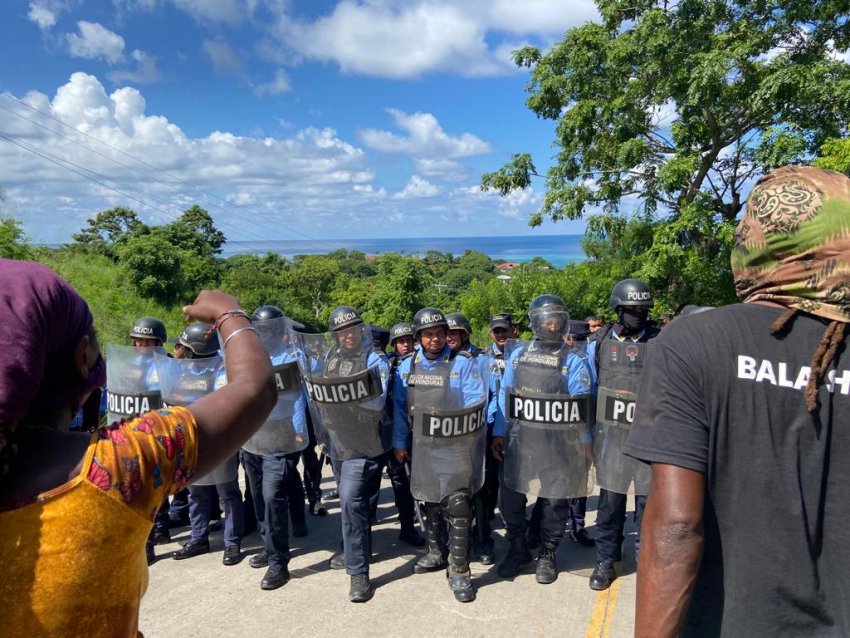
The Honduran army and national police converged on a Garífuna community in Punta Gorda — on the island of Roatán — on November 7, and violently evicted residents. Police arrested six community members, and at least 55 people were injured.
Punta Gorda is home to the first Garífuna community in Honduras, which was founded in 1797, after the British exiled them from Saint Vincent and the Grenadines.
The community has continually fought against land grabs and evictions by commercial interests, such as transnational corporations, and the government. This included a violent eviction carried out by 60 police officers in April 2011 that forcibly removed 12 families from the area. The police carried out the eviction on behalf of members of the military who claimed to own the land and ordered the destruction of people’s houses.
An Inter-American Court of Human Rights ruling in 2015 found that the Juan Orlando Hernández government had violated the collective land ownership rights of Garífuna communities.
The Garífuna people reclaimed land at the entrance to their community in Punta Gorda on September 3, which formed part of their ancestral lands. But, Garífuna people have been arrested for “usurpation” of land, or illegally occupying someone else’s land.
The Civic Council of Popular and Indigenous Organisations of Honduras — Honduras’ biggest coalition of indigenous rights and environmental activist organisations — released a statement on November 8 condemning the eviction.
“Indigenous and Garífuna communities in Honduras have the right to have our ancestral territories recognised. Third parties claiming to be owners of our territories were deceived or acquired land illegally and illegitimately.
“The state of Honduras, through the national police, army and judiciary, does not recognise this right, fails to comply with international conventions and judgements of the Inter-American Court of Human Rights and fails in its duty to protect the culture and identity of the Honduran people.”
The Punta Gorda Community Land Defence Committee said that “the Garífuna people are holders of property and rights over the lands and resources they have occupied ancestrally, and therefore have rights to be legally recognised as the legitimate owners of their territory”.
Melissa Martínez, a coordinator of the Black Fraternal Organisation of Honduras — a coalition dedicated to fighting for indigenous Garífuna rights — was one of the people arrested.
Honduran Human Rights group Convergence Against Continuism released a statement on November 8 expressing solidarity with the Garífuna community and calling for justice.
“Although we are aware that this action is located within the legal framework conducted by judicial structures and the Public Ministry that are still alive from the former criminal and corrupt regime,” the statement read, “we regret that the police and the army, under the command of public officials of the government presided over by Xiomara Castro, lend themselves to violently implement decisions that violate the rights of indigenous peoples and violate article 169 of the ILO [International Labour Organization].”
Various human rights organisations demanded the release of the six prisoners, an investigation into the police’s violent conduct and legal recognition of Garífuna land.
In response to the events, President Castro said she was not aware of the eviction nor informed prior to the eviction being executed, and has “requested a report of the violent, judicially ordered eviction”.
“The Garífuna claim justice for their ancestral lands,” said Castro. “This should go to trial, not to eviction that criminalises [their] rights. I demand immediate freedom and respect for human rights.”
Since then, the six Garífuna prisoners have been conditionally released, pending an initial court hearing on November 26 in Roatán.
Honduran human rights minister Natalie Loque announced in a November 9 press conference that an Inter-institutional commission will investigate the eviction and land issues in Roatán. The commission visited Punta Gorda on November 10 and has 60 days to present a report to the national Congress.